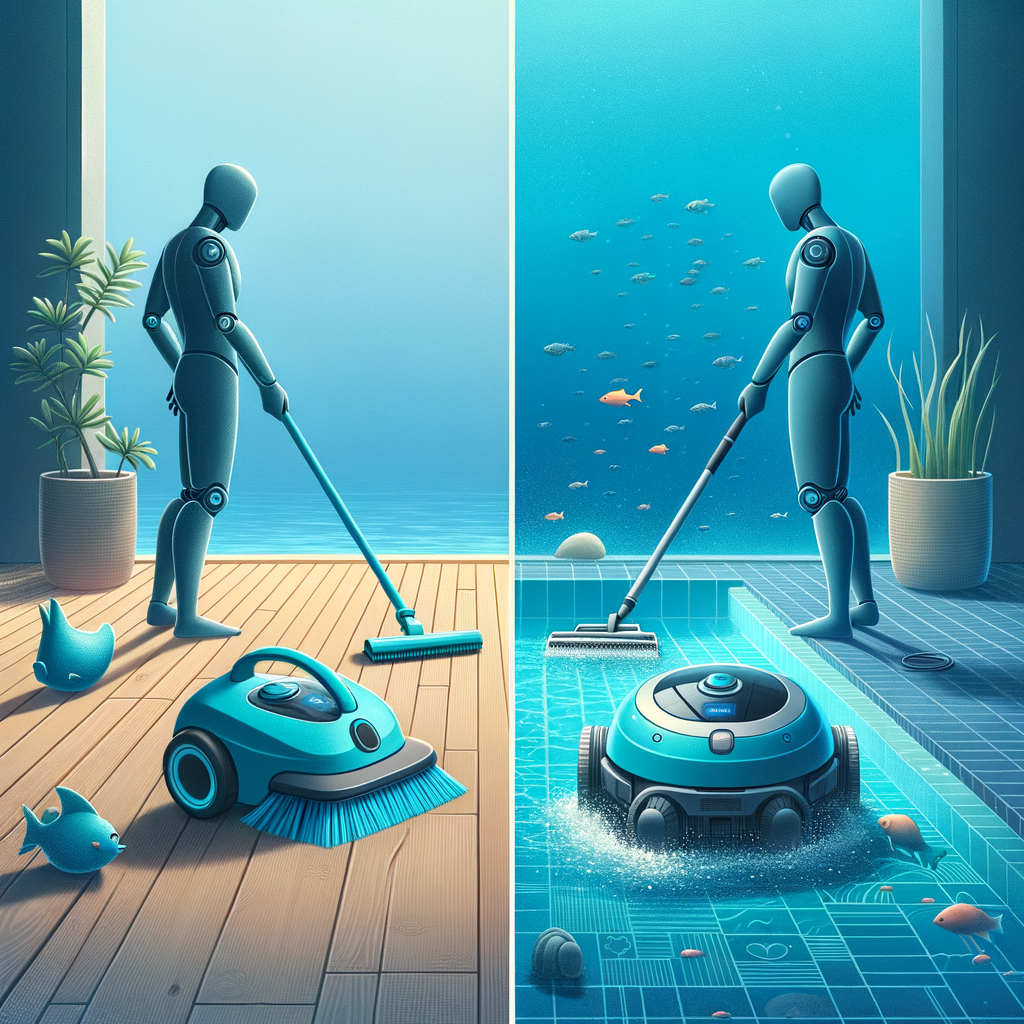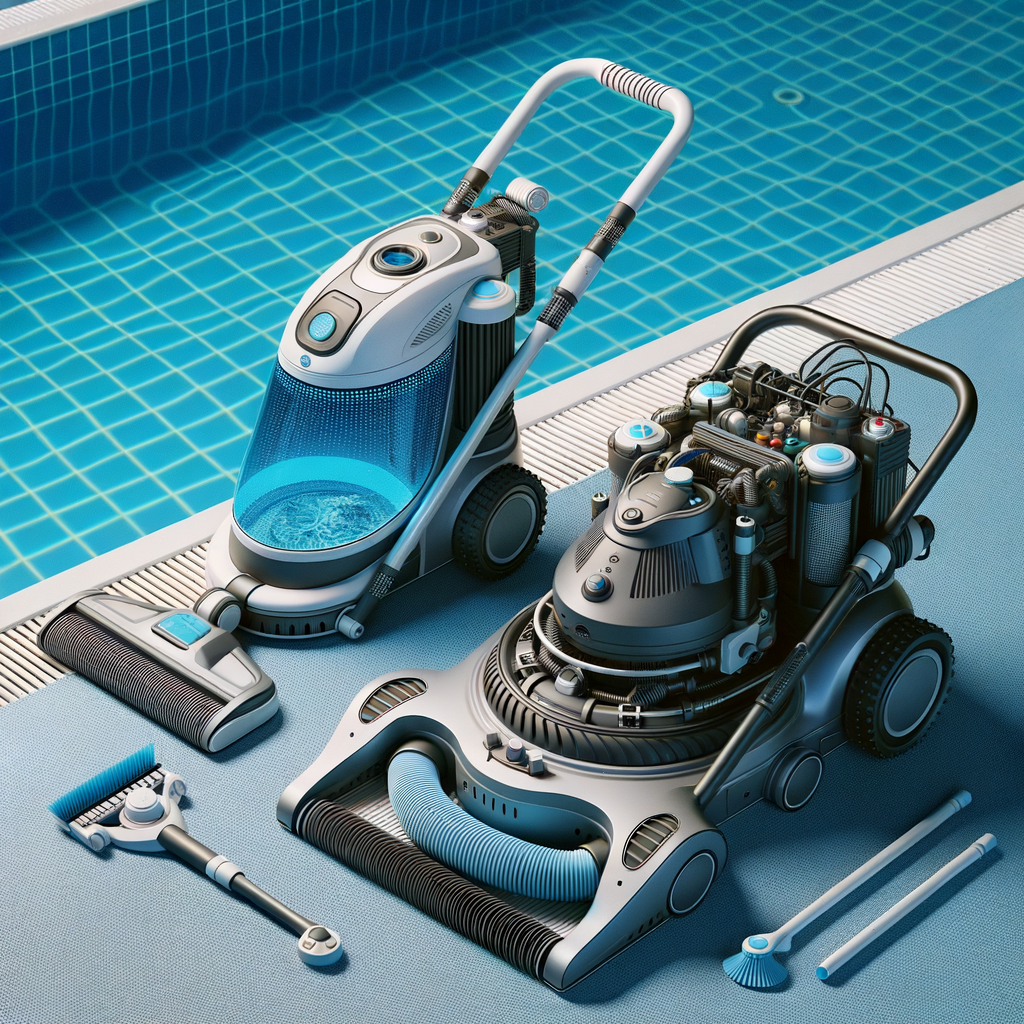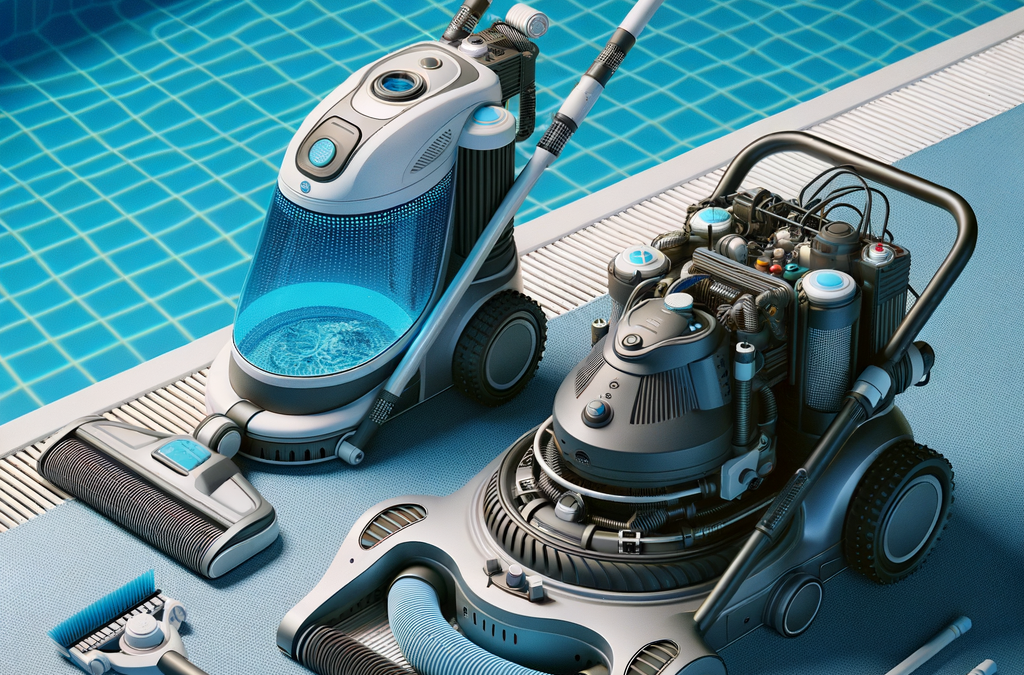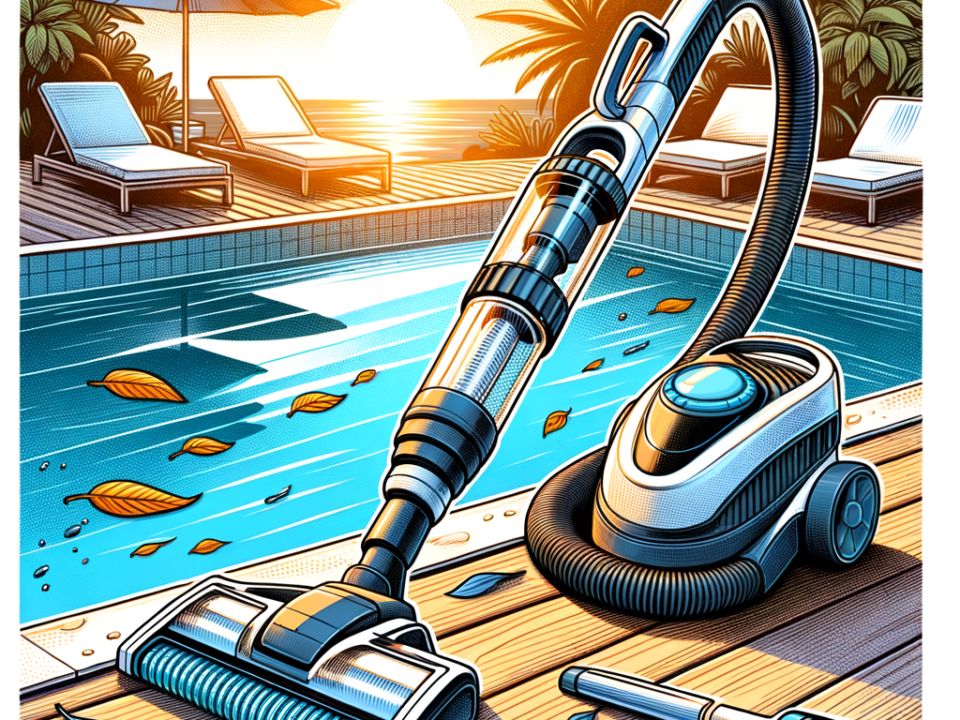
Transform Your Backyard Oasis with Stunning Custom Pools Today!
May 22, 2024
Transform Your Pool Cleaning with the Powerful YouSky Handheld Pool Vacuum
May 22, 2024“Handheld Precision vs. Automatic Ease: Choose Your Perfect Pool Clean!”
Table of Contents
Introduction
Handheld pool vacuums and automatic pool cleaners are two popular options for maintaining the cleanliness of swimming pools. Handheld pool vacuums are manually operated devices that allow users to target specific areas of the pool, offering precision and control. They are typically more affordable and are ideal for smaller pools or for spot cleaning. On the other hand, automatic pool cleaners are designed to operate independently, using programmed patterns or random movements to cover the entire pool surface. These cleaners can be more expensive but offer the convenience of hands-free operation, making them suitable for larger pools or for those who prefer a low-maintenance solution. Both types of cleaners have their own advantages and are chosen based on the specific needs and preferences of the pool owner.
User Experience: Handheld Pool Vacuum Vs Automatic Pool Cleaner

When it comes to maintaining a pristine swimming pool, the choice between a handheld pool vacuum and an automatic pool cleaner can significantly impact the user experience. Both devices serve the essential function of removing debris and ensuring water clarity, yet they differ markedly in terms of operation, convenience, and overall user satisfaction. Understanding these differences can help pool owners make an informed decision that best suits their needs.
Handheld pool vacuums are often favored for their simplicity and direct control. These devices require manual operation, meaning the user must guide the vacuum across the pool’s surfaces to remove dirt and debris. This hands-on approach allows for meticulous cleaning, as the user can target specific areas that may require more attention. Additionally, handheld vacuums are generally more affordable than their automatic counterparts, making them an attractive option for budget-conscious pool owners. However, the manual nature of these vacuums can be labor-intensive and time-consuming, particularly for larger pools. Users must be prepared to invest a significant amount of time and effort to achieve the desired level of cleanliness.
In contrast, automatic pool cleaners offer a more convenient and time-saving solution. These devices operate independently, navigating the pool’s surfaces to collect debris without requiring constant supervision. Automatic cleaners come in various types, including suction-side, pressure-side, and robotic models, each with its own set of features and benefits. Suction-side cleaners connect to the pool’s filtration system and use the suction power to move around and clean. Pressure-side cleaners, on the other hand, use the pressure from the pool’s pump to propel themselves and collect debris in an attached bag. Robotic cleaners are the most advanced, featuring their own filtration systems and programmable cleaning patterns.
The primary advantage of automatic pool cleaners is their ability to save time and reduce manual labor. Once set up, these devices can be left to operate on their own, allowing pool owners to focus on other tasks or simply enjoy their leisure time. This hands-off approach is particularly beneficial for those with busy schedules or physical limitations that make manual cleaning challenging. Moreover, robotic cleaners often come equipped with advanced features such as remote control operation, scheduled cleaning cycles, and even smartphone connectivity, further enhancing user convenience.
However, the convenience of automatic pool cleaners comes at a higher cost. These devices are generally more expensive than handheld vacuums, both in terms of initial purchase price and ongoing maintenance. Additionally, some users may find the setup process for automatic cleaners to be more complex, requiring a certain level of technical knowledge. Despite these drawbacks, the long-term benefits of reduced manual labor and consistent cleaning performance often justify the investment for many pool owners.
In conclusion, the choice between a handheld pool vacuum and an automatic pool cleaner ultimately depends on individual preferences and circumstances. Handheld vacuums offer a cost-effective and precise cleaning solution but require significant manual effort. On the other hand, automatic pool cleaners provide unparalleled convenience and time savings, albeit at a higher cost. By carefully considering these factors, pool owners can select the device that best aligns with their needs, ensuring a clean and enjoyable swimming environment.
Maintenance Needs: Handheld Pool Vacuum Vs Automatic Pool Cleaner
When considering the maintenance needs of a swimming pool, the choice between a handheld pool vacuum and an automatic pool cleaner is pivotal. Each option presents distinct advantages and challenges, which can significantly impact the overall upkeep of the pool. Understanding these differences is essential for making an informed decision that aligns with one’s maintenance preferences and lifestyle.
Handheld pool vacuums are often favored for their simplicity and direct control. These devices require manual operation, meaning the user must physically guide the vacuum across the pool’s surfaces. This hands-on approach allows for meticulous cleaning, as the operator can target specific areas that may require more attention. Additionally, handheld vacuums are generally more affordable than their automatic counterparts, making them an attractive option for budget-conscious pool owners. However, the manual nature of these vacuums means that they demand a considerable amount of time and effort. Regular use is necessary to maintain a pristine pool, which can be a significant commitment for those with busy schedules.
In contrast, automatic pool cleaners offer a more convenient solution. These devices operate independently, navigating the pool and cleaning surfaces with minimal human intervention. There are various types of automatic cleaners, including suction-side, pressure-side, and robotic models, each with unique features and capabilities. Suction-side cleaners attach to the pool’s filtration system, using the suction power to move around and collect debris. Pressure-side cleaners, on the other hand, connect to the return jet and use water pressure to propel themselves and gather dirt. Robotic cleaners are the most advanced, equipped with their own filtration systems and programmable settings for optimal performance.
The primary advantage of automatic pool cleaners is their ability to save time and effort. Once set up, these devices can operate on a schedule, ensuring the pool remains clean with minimal oversight. This convenience is particularly beneficial for those who may not have the time or inclination to manually vacuum their pool regularly. However, this ease of use comes at a higher cost. Automatic pool cleaners are generally more expensive than handheld vacuums, both in terms of initial purchase price and ongoing maintenance. Additionally, they may require more complex repairs if they malfunction, which can further add to the overall expense.
Another consideration is the effectiveness of each cleaning method. Handheld vacuums allow for precise control, enabling the user to thoroughly clean hard-to-reach areas and stubborn spots. This level of detail can be challenging for some automatic cleaners, particularly those that rely on random patterns to navigate the pool. However, advanced robotic cleaners have made significant strides in this area, offering sophisticated navigation systems that can cover the entire pool efficiently.
In terms of maintenance, handheld vacuums are relatively straightforward. They typically require regular cleaning of the filter or bag and occasional checks for wear and tear. Automatic cleaners, while convenient, may necessitate more frequent maintenance due to their complex components. For instance, robotic cleaners need periodic filter cleaning and may require software updates or troubleshooting.
Ultimately, the choice between a handheld pool vacuum and an automatic pool cleaner hinges on individual preferences and circumstances. Those who value control and are willing to invest time in pool maintenance may find handheld vacuums to be the ideal solution. Conversely, individuals seeking convenience and willing to invest in advanced technology may prefer the benefits of an automatic cleaner. By carefully weighing the maintenance needs and associated costs, pool owners can select the option that best suits their lifestyle and ensures a clean, inviting swimming environment.

Cost Analysis: Handheld Pool Vacuum Vs Automatic Pool Cleaner
When considering the cost implications of maintaining a pristine swimming pool, the choice between a handheld pool vacuum and an automatic pool cleaner becomes a significant decision. Both options offer distinct advantages and disadvantages, which can influence the overall expense associated with pool maintenance. A thorough cost analysis of these two cleaning methods reveals the financial considerations that pool owners must weigh.
Initially, the upfront cost of a handheld pool vacuum is generally lower than that of an automatic pool cleaner. Handheld vacuums are typically priced between $50 and $200, depending on the brand and features. In contrast, automatic pool cleaners, which include robotic, suction-side, and pressure-side models, can range from $300 to over $1,000. This substantial difference in initial investment can be a decisive factor for budget-conscious pool owners.
However, the initial purchase price is only one aspect of the overall cost. The operational expenses associated with each type of cleaner must also be considered. Handheld pool vacuums require manual effort, which translates to time and labor costs. Pool owners must dedicate time to physically maneuver the vacuum, ensuring that every corner of the pool is cleaned. This can be particularly labor-intensive for larger pools, potentially leading to higher long-term costs in terms of personal time or hired help.
On the other hand, automatic pool cleaners are designed to operate with minimal human intervention. Once set up, they can clean the pool autonomously, saving significant amounts of time. While this convenience is appealing, it comes with its own set of operational costs. For instance, robotic pool cleaners consume electricity, which can add to the monthly utility bill. Additionally, these devices may require periodic maintenance and replacement parts, such as brushes or filters, which can further increase the overall expense.
Energy efficiency is another critical factor in the cost analysis. Handheld pool vacuums, particularly those that are battery-operated or manually powered, tend to be more energy-efficient compared to their automatic counterparts. Robotic cleaners, while effective, can be energy-intensive, especially if used frequently. Suction-side and pressure-side cleaners, which rely on the pool’s filtration system, can also increase energy consumption by placing additional strain on the pool pump.
Durability and lifespan are also important considerations. Handheld pool vacuums, being simpler in design, often have fewer components that can break down. This can result in a longer lifespan and lower replacement costs. Conversely, automatic pool cleaners, with their complex mechanisms and electronic components, may be more prone to wear and tear. The potential need for repairs or replacements can add to the long-term cost, making them a more expensive option over time.
In conclusion, the cost analysis of handheld pool vacuums versus automatic pool cleaners involves multiple factors beyond the initial purchase price. While handheld vacuums are more affordable upfront and can be more energy-efficient, they require significant manual effort and time. Automatic pool cleaners, though more expensive initially and potentially in terms of energy consumption, offer unparalleled convenience and efficiency. Pool owners must carefully consider their budget, time availability, and long-term maintenance costs when deciding between these two cleaning methods. By evaluating these factors, they can make an informed decision that best suits their financial situation and pool maintenance needs.
Efficiency Comparison: Handheld Pool Vacuum Vs Automatic Pool Cleaner
When it comes to maintaining a pristine swimming pool, the choice between a handheld pool vacuum and an automatic pool cleaner can significantly impact efficiency. Both devices serve the essential function of removing debris and ensuring water clarity, yet they operate in fundamentally different ways, each with its own set of advantages and limitations. Understanding these differences is crucial for pool owners aiming to make an informed decision.
Handheld pool vacuums are typically manual devices that require the user to guide the vacuum head across the pool surface. These vacuums are often praised for their precision and control, allowing users to target specific areas that may require more attention. For instance, if a particular corner of the pool tends to accumulate leaves or dirt, a handheld vacuum can be directed to focus on that spot. This level of control can be particularly beneficial for smaller pools or those with intricate designs, where debris may settle in hard-to-reach areas. Additionally, handheld vacuums are generally more affordable and easier to store, making them an attractive option for budget-conscious pool owners.
On the other hand, automatic pool cleaners offer a more hands-off approach to pool maintenance. These devices are designed to operate independently, navigating the pool floor and walls to remove debris without the need for constant supervision. Automatic cleaners come in various types, including suction-side, pressure-side, and robotic models, each with unique features and capabilities. Suction-side cleaners attach to the pool’s filtration system, using the suction power to move around and collect debris. Pressure-side cleaners, conversely, use water pressure from the pool’s pump to propel themselves and gather dirt into a separate bag. Robotic cleaners are the most advanced, equipped with their own motors and filtration systems, allowing them to operate independently of the pool’s existing infrastructure.
The primary advantage of automatic pool cleaners lies in their convenience and time-saving potential. Once set up, these devices can run on a schedule, ensuring the pool remains clean with minimal effort from the owner. This can be particularly advantageous for larger pools or for individuals with busy lifestyles who may not have the time to manually vacuum their pool regularly. Moreover, robotic cleaners often come with advanced features such as programmable cleaning cycles, remote control operation, and even smartphone connectivity, further enhancing their ease of use.
However, the efficiency of automatic pool cleaners can be influenced by several factors, including the pool’s shape, size, and the type of debris commonly found. For example, while robotic cleaners are highly effective at removing fine particles and algae, they may struggle with larger debris such as leaves or twigs. Additionally, the initial cost of purchasing an automatic cleaner can be significantly higher than that of a handheld vacuum, which may be a consideration for some pool owners.
In conclusion, both handheld pool vacuums and automatic pool cleaners offer distinct advantages in terms of efficiency. Handheld vacuums provide precise control and are cost-effective, making them suitable for smaller pools or targeted cleaning tasks. In contrast, automatic pool cleaners offer unparalleled convenience and are ideal for larger pools or those seeking a low-maintenance solution. Ultimately, the choice between the two will depend on individual preferences, pool characteristics, and budget considerations. By carefully evaluating these factors, pool owners can select the most efficient cleaning method to keep their pool in optimal condition.
Q&A
1. **Which is more time-efficient?**
– Automatic pool cleaner.
2. **Which typically costs less upfront?**
– Handheld pool vacuum.
3. **Which requires more manual effort?**
– Handheld pool vacuum.
4. **Which is better for large debris?**
– Handheld pool vacuum.
Conclusion
Handheld pool vacuums offer greater control and precision, making them ideal for spot cleaning and smaller pools, but they require more manual effort and time. Automatic pool cleaners, on the other hand, provide convenience and efficiency by operating independently, making them suitable for larger pools and regular maintenance, though they come at a higher cost. Ultimately, the choice depends on the user’s budget, pool size, and preference for manual versus automated cleaning.





